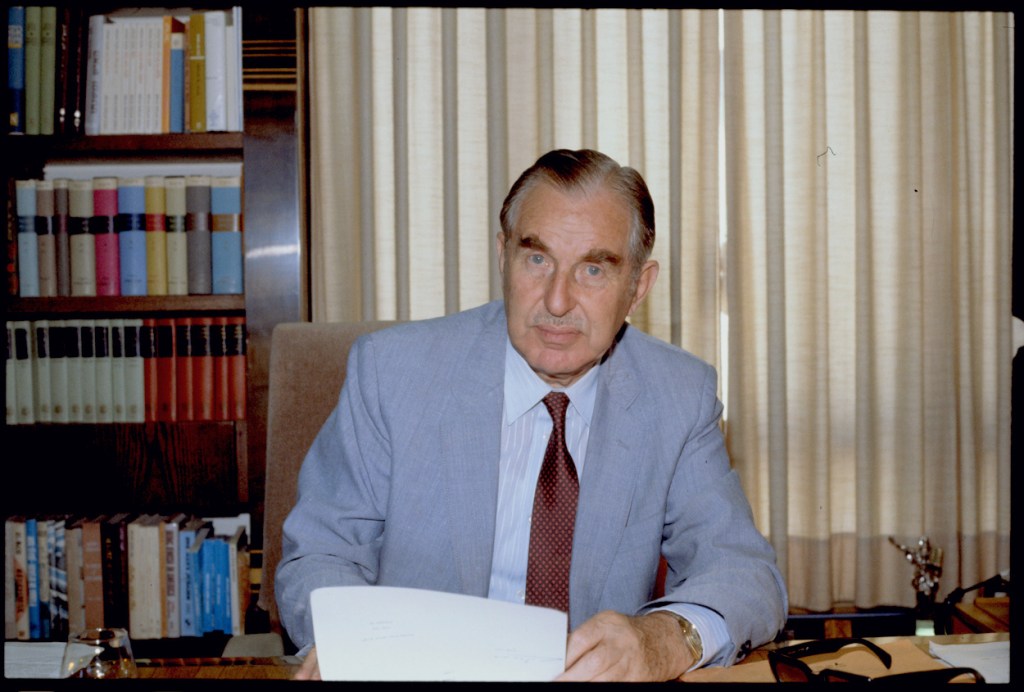In 1979 the price of gas at the American pump doubled to $39.50 a barrel – $172 in today’s money. The future of industrial civilisation seemed in doubt. But to Jimmy Carter, these oil woes were a distraction from the real issue: the moral failure of the American people. ‘Much deeper’ than the energy crisis, said the President, was a ‘crisis of confidence’ in politics and society, born out of a ‘worship of self-indulgence and consumption’.
It was an example of a very old trick. The default response of a governing class to a crisis is to frame it as a general moral one – one that, conveniently, implicates everyone and no one in particular. A ‘crisis of confidence’, as opposed to an oil crisis, was wide and nonspecific enough to have no real solution: no solution, at least, that would require Carter to leave office.
Our own era has no shortage of problems, and no shortage of crises of confidence to explain them away. The most influential of these has been ‘postliberalism’. Emerging in the late 2000s, postliberalism is an ideology that traces the crisis of the West all the way back to Thomas Hobbes and John Locke. The two philosophers invented the ‘liberal subject’, which redefined human relations in terms of individual rights rather than obligations to one another. The result, they argue, has been the gradual destruction of those intermediary institutions between the individual and the state – the families, churches, guilds, unions, and local communities – that people need for fulfilling lives. According to a recent manifesto and a series of articles published in these pages by some of the movement’s leading lights (such as Adrian Pabst, John Milbank, Jon Cruddas and Michael Lind), the consequences of this ‘liberal primacy of individual choice’ has been general social and moral rot as westerners become more and more atomised.
The solutions offered by the postliberals vary. Some, like the Lind and Maurice Glasman, look to the postwar economic consensus; John Milbank, Philip Blond, and Wolfgang Streeck to the Holy Roman Empire and the dream of universal monarchy. All involve a rejection of social and economic liberalism, the primacy of natural law, and a society organised along communitarian lines.
People like Milbank and Glasman often style themselves as outcasts. But postliberalism has actually been influential at the highest levels of government for close to three decades. New Labour was an explicitly postliberal and communitarian project, for one. Tony Blair and Philip Gould drew on the work of communitarian philosophers like John MacMurray and Amitai Etzioni in a rejection of the liberal subject and selfish individualism. New Labour undertook a massive decentralisation of the state to the courts and quangos, along with a reorganisation of society around the Stakeholders: chartered faith, environmental, charitable, and business groups that mediate between the citizen and the government. David Cameron’s ‘Big Society’ agenda, which further strengthened intermediary institutions like Kids Company, was inspired by Blond’s writing. Theresa May and Nick Timothy were both avowed communitarians. The postliberal think tank ‘Onward’, which included former Mayites like Timothy and Will Tanner, more or less took over the Sunak ministry in its final months, and seem responsible for putting National Service in the 2024 Conservative manifesto. Now, Morgan McSweeney has arrived at communitarian ‘Blue Labour’ ideas by way of Glasman.
This is also the case in a more general sense. No period since the Middle Ages has had a stronger sense of mutual obligation and natural law. We’re not faced with a cynical ‘mafiacracy’ of brokers and fixers, as Lind recently put it – but a bigoted and cajoling moral consensus that’s enforced at every level of society. Pabst speaks of a great ‘centralisation of power’ under liberalism, but in the 2020s governments in Europe now have to contend with interminable quangos, NGOs, national courts, international courts, and local assemblies that invoke doctrines of transcendent moral law to oppose them. Cruddas has called for a new ‘stakeholder’ corporate governance model and Milbank wants mandatory ‘social purposes from firms’ – this in the age of ESG, only now in retreat, in which shareholder value was subordinated to moral causes.
Refugee inflows are justified on the basis of universal human ‘obligations’; and mass migration was defended by former cabinet secretary Gus O’Donnell as a means to benefit the wider human community. Liberal freedoms of speech and association have been abolished in the interests of preserving communal harmony; the atrocity in Rotherham was buried for the same reasons. Ideas of community obligation are now so strong that the entire developed world was locked indoors for two years to stop the spread of Covid. When we look at Davos, what we find proclaimed there isn’t the cult of material progress, but communitarianism and degrowth.
It wouldn’t be an exaggeration to say that some form of postliberalism is now the dominant ideology on planet Earth. Faced with specific material problems, the talk in Whitehall, in the Kremlin, in every chancellery from Lisbon to Beijing is instead of moral ones: of individualism run amok and the need for new solidarities.
Postliberalism has become our governing classes’ default response to right-wing populism. Not just because it is, in almost every respect, an elaboration of the status quo, but because it redirects people’s specific grievances towards abstract moral problems. It is the Carter-ism of our age. In Britain, people like David Cameron and Boris Johnson campaigned as neoliberal populists who would close the border, lower taxes, and lock up the criminals. In both cases these mandates were – often through the influence of these same theorists – then hocus-pocused into a search for community and belonging, into the Big Society and Levelling Up.
And yet the voters always seem unmoved. Mayism as a project had imploded well before Brexit negotiations began. The National Service pledge in 2024 is another case in point: did the voters care more about building a society of obligation and service, or specific grievances about taxes and the border? Sunak and Tanner certainly got their answer.
Pabst, Milbank, Cruddas, and Lind call for a new postliberal economics, a ‘benign corporatism’ of guilds and collective bargaining. But the material conditions for this kind of system manifestly no longer exist. Go to populist heartlands like South Shields and Clacton and you won’t find industrial proletariat but a mass of small traders (a class greatly empowered by the internet) and office employees – a petite bourgeoisie. And like any petite bourgeoise throughout history their main concerns are personal autonomy and getting the monkey off their back. What these people were voting for in 2019 was a politics that would limit the scope of obligations, not expand them. They did not feel a sense of obligation to illegal immigrants or violent criminals, and wanted to elect someone who’d free them from these ‘solidarities’. Terrible things have been done to the people living in places like Rotherham, and it’s simply frivolous to now tell them that their real problem is too much individualism.
Real reform in western societies doesn’t call for new solidarity but its opposite: a new spirit of blasphemy – against the state cult of Human Rights
Postliberal theorists deplore the current social order. But in 2025 the pillars of this order are exactly the sort of intermediary institutions that they praise – those that stand between elected governments and the people. These are the courts that stop deportations, the NGOs that turn paedophiles loose, the quangos that usurp ministers. In all advanced democracies the conflict is now between the executive and the institutions that constrain it; for the last fifteen years postliberals have always sided with the latter, to the ruin of British populism.
Keenly involved in politics, these thinkers are unwarrantedly high-handed when it comes to politicians. If the great sin of intellectuals in the twentieth century was power worship, then the sin of postliberal academics in the 21st century is whatever that opposite of that is. Donald Trump, braving prosecution and two assassination attempts, has just achieved the kind of political victory that, alone, might make some of Lind, Pabst, and Milbank’s aims achievable. Yet the new postliberal manifesto makes almost no mention of this, aside from a pious noise about ‘ugly nativist populism’.
Start to solve the problems that postliberals complain about and, rest assured, they’ll have new ones for you: often invented on the fly. At a recent conference in Cambridge held to publicise the manifesto, the dominant theme was not what a Trump administration might do, but the ‘new threat’ of Musk-inspired transhumanism. Besides, the defence of national sovereignty that Trump had just undertaken hadn’t been worth the effort after all because, as Milbank exclaimed, the Westphalian state ‘is not real postliberalism!’
This sort of one-upmanship is de rigueur. Since we can find examples of individualism at any stage in history, it’s always possible for postliberals to dismiss anything as simply another form of liberalism. But it’s revealing of an essential quietism: a wilful aloofness from the world. Claims that we have to wind things back to before the Peace of Westphalia, that nothing can get better until we repudiate Thomas Hobbes – all so many words to say that nothing can ever change, and that anyone who tries is somehow complicit.
Real reform in western societies doesn’t call for new solidarity but its opposite: a new spirit of blasphemy – against the state cult of Human Rights. It requires joining hands with demagogic political forces; along with a massive strengthening of executive powers and the diminution of intermediary institutions like the ECHR, the devolved administrations, and judicial review. People are being thrown into prison for Facebook posts. We are now faced with the most solid moral consensus since the 17th century; opponents of this society must now ensure that ‘all that is solid melts into air’.
Does the western world suffer from a spiritual malaise? Probably. But we can’t mark this down to liberal individualism, of which almost no trace now exists. We don’t live in the age of relativism but of orthodoxy; postliberalism, as it currently stands, is simply the demand that this orthodoxy be more rigorously enforced. Official moral codes, decentralised power, and mighty international institutions that can bring sovereign governments to heel: postliberals would see glory in such an early modern society. Others will find it strangely familiar.
This is the final article in a series of articles on postliberalism. You can read the other pieces here.








Comments